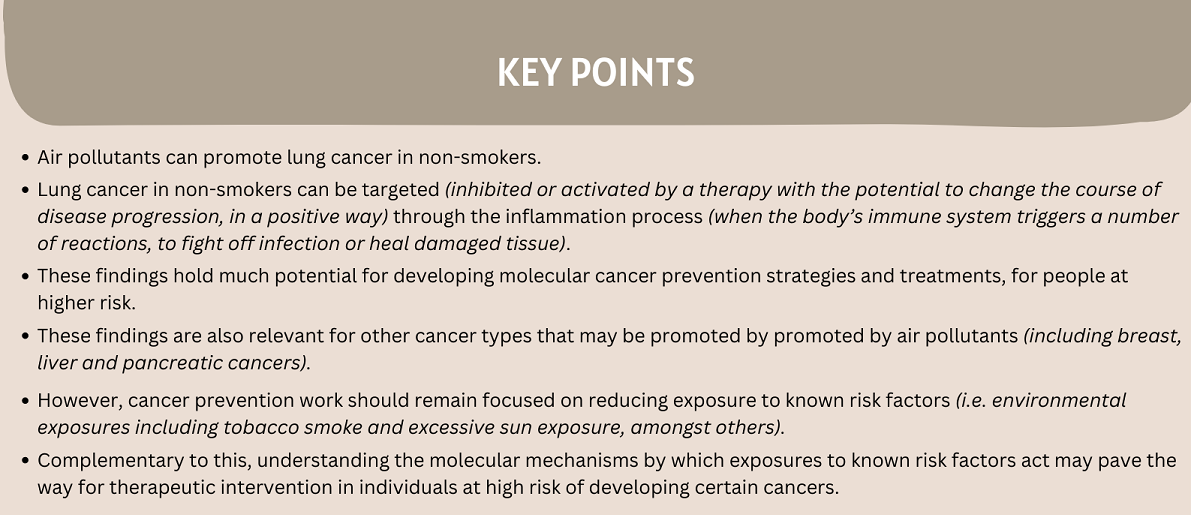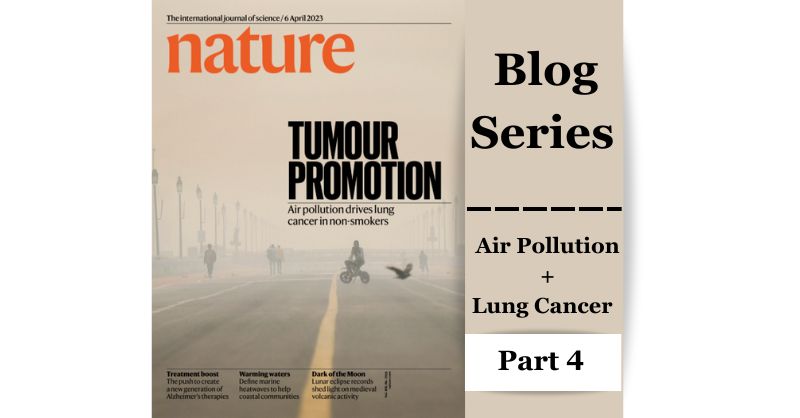Summary and implications for lung cancer prevention, by Dr William Hill
This is the fourth and final piece in a special four-part series, looking at how air pollution can cause lung cancer in people who have never smoked.
Authors on the paper, Professor James DeGregori, Dr William Hill, and Dr Emilia Lim all contributed to the series.

A significant body of research has explored the way that environmental carcinogens result in genetic mutations, through direct DNA damage. These environmental carcinogens include tobacco smoke and UV light, among others. However, the non-mutagenic effects of these carcinogens are much less well understood.
Tumour promotion and inflammation as a therapeutic target
Research evidence to date has supported the idea that cells with cancer-causing mutations accumulate naturally as we age. In most cases, normal immune system checks can prevent these mutations from developing into cancers. However, our study has highlighted how air pollutants smaller than 2.5 microns (PM2.5) can promote the growth of cells carrying cancer-causing mutations in the lungs.


These findings hold much relevance for public health policy and planning. Preventing the accumulation of mutations is highly complex (and tied to a broad range of factors spanning lifestyle, working and living environment, and more ‘upstream’ policies). Once acquired, mutations cannot be removed. By contrast, however, inflammation is a molecular process capable of being targeted therapeutically. As a therapeutic target, therefore, it holds much potential for the development of possible lung cancer prevention treatments.
Relevance for other cancer types
Our research shows that PM2.5 is involved in the promotion of lung cancer specifically. However, it also provides important evidence to help understand the mechanisms of PM2.5 travelling beyond the lungs. PM2.5 is capable of travelling around the body, reaching and simultaneously damaging multiple tissues directly. Pollutants more generally are also capable of causing indirect damage to tissues, resulting in systemic inflammation.
While our findings are specific to lung cancer, other studies have suggested that air pollution is associated with increased mortality risk for several types of cancer. These include breast, liver and pancreatic cancer.

Relevance for tumorigenesis models
This research also has considerable implications for our current understanding of tumorigenesis models.
There are currently 126 Class 1 carcinogens classified by the International Agency for Research on Cancer (IARC). A recent study found that 17 of 20 tested Class 1 carcinogens promoted cancer without increasing the number of mutations. However, it is not definitively known how many of these Class 1 carcinogens act via a tumour promotion mechanism.
We are currently lacking the assays and laboratory methods necessary to determine if all of these carcinogens (alongside other as yet unidentified agents) could act via a similar mechanism. Deciphering exactly how these carcinogenic agents operate at the molecular level would help to identify additional opportunities for cancer prevention intervention.

Relevance for cancer prevention – looking ahead
Cancer prevention work should remain focused on reducing exposure to known risk factors. These include tobacco smoking, alcohol and excessive UV exposure. However, understanding the molecular mechanisms by which these exposures act may pave the way for therapeutic intervention in individuals at high risk of developing certain cancers.
We hope that a more in-depth understanding of the intricate inflammatory pathways at play – and of their effects on cancer in its earliest stages – may allow us to develop new molecular prevention strategies in the future. Large-scale cancer prevention trials are necessary for collecting this level and volume of data. These require large cohorts of individuals, together with long study periods for identifying any clinically significant effects. Gathering robust evidence will therefore require considerable time, funding and research collaboration.
Nevertheless, we hope to build on existing work to help target and tackle cancer as early as possible, to give the greatest chances for survival and a minimised impact on longer-term quality of life.
The views expressed are those of the author. Posting of the blog does not signify that the Cancer Prevention Group endorses those views or opinions.

